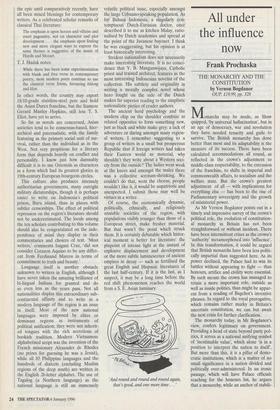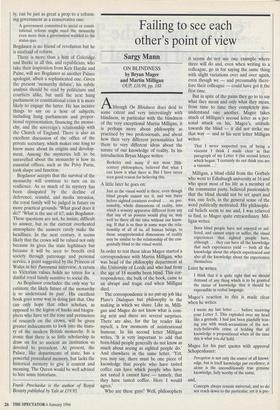All under the influence now
Frank Prochaska
THE MONARCHY AND THE CONSTITUTION by Vernon Bogdanor OUP, £19.99, pp. 328 Monarchs may be made, as Shaw quipped, 'by universal hallucination', but in an age of democracy, war and revolution they have needed tenacity and guile to survive. The British monarchy has done better than most and its adaptability is the measure of its success. There have been calculated accommodations all round, as reflected in the crown's adjustment to middle-class respectability, to the extension of the franchise, to shifts in imperial and commonwealth affairs, to socialism and the welfare state. But the crown's greatest adjustment of all — with implications for everything else — has been to the rise of Parliamentary sovereignty and the growth of ministerial power.
As Mr Vernon Bogdanor points out in a timely and impressive survey of the crown's political role, the evolution of constitution- al monarchy in Britain has not been straightforward or without incident. There have been intermittent crises as the crown's `authority' metamorphosed into 'influence'. In this transformation, it could be argued that British monarchs have been less politi- cally impartial than suggested here. As its power declined, the Palace had to win its battles without appearing to fight — thus honours, artifice and civility were essential. By such means the crown has managed to retain a more important role, outside as well as inside politics, than might be appar- ent from a reading of Bagehot's inventive phrases. In regard to the royal prerogative, which remains rather murky in Britain's uncertain constitution, we can but await the next crisis for further clarification.
The monarchy today, in Mr Bogdanor's view, confers legitimacy on government. Providing a head of state beyond party pol- itics, it serves as a national unifying symbol of 'inestimable value', which alone 'is in a position to interpret the nation to itself . But more than this, it is a pillar of demo- cratic institutions, which is a matter of no small significance in a nation divided and politically over-administered. In an ironic passage, which will have Palace officials reaching for the honours list, he argues that a monarchy, while an anchor of stabili- ty, can be just as great a prop to a reform- ing government as a conservative one:
A government committed to social or consti- tutional reform might need the monarchy even more than a government wedded to the status quo.
Bogdanor is no friend of revolution but he is unafraid of reform.
There is more than a hint of Coleridge and Burke in all this, and republicans, who take their inspiration from Keir Hardie and Paine, will see Bogdanor as another Palace apologist, albeit a sophisticated one. Given the present 'monarchy debate', his subtle analysis should be read by politicians and courtiers alike, but until the next hung parliament or constitutional crisis it is more likely to engage the latter. He has incisive things to say on a host of subjects, including hung parliaments and propor- tional representation, financing the monar- chy, and the sovereign's relationship with the Church of England. There is also an excellent discussion of the office of the private secretary, which makes one long to know more about its origins and develop- ment. Among the mysteries left to be unravelled about the monarchy is how its essential offices, such as the Privy Purse, took shape and function.
Bogdanor accepts that the survival of the monarchy will continue to turn on its resilience. As so much of its mystery has been dissipated by the decline of deference, scandal, and media intrusion, the royal family will be judged in future on more practical grounds. 'What good does it do?' What is the use of it?, asks Bogdanor. These questions are not, he insists, difficult to answer, but in the current overheated atmosphere the answers rarely make the headlines. In the next century, it seems likely that the crown will be valued not only because its gives the state legitimacy but because it will be seen to benefit civil society through patronage and personal service, a point suggested by the Princess of Wales in her Panorama interview. A return to Victorian values holds no terror for a dutiful royal family sensitive to social ills.
As Bogdanor concludes: the only way 'to estimate the likely future of the monarchy is to understand its past'. His excellent book goes some way in doing just that. One can only hope that other scholars, as opposed to the legion of hacks and biogra- phers who have set the tone and perimeters of research on the crown, will be given greater inducements to look into the histo- ry of the modern British monarchy. It is ironic that there is so little scholarship to draw on for so ancient an institution so devoted to precedent. At present, the Palace, like departments of state, has a powerful procedural memory, but lacks the historical memory to give it context and meaning. The Queen would be well advised to hire some historians.
Frank Prochaska is the author of Royal Bounty published by Yale at f19.95.



















































 Previous page
Previous page